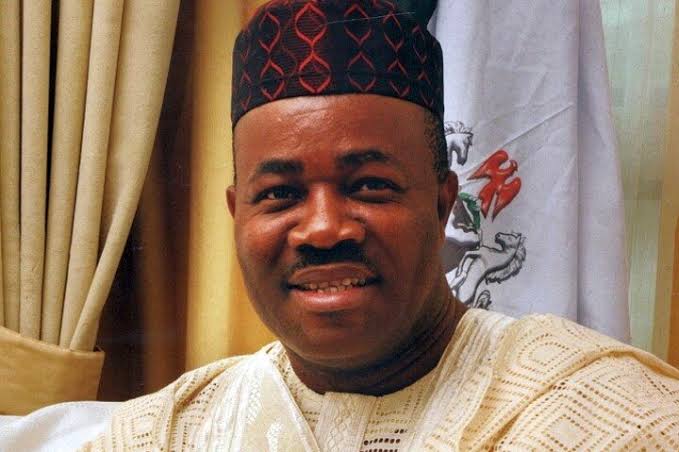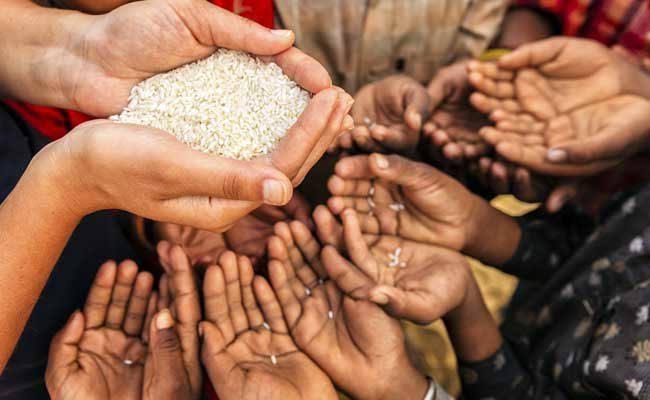Opinion
Fast Tracking South-South Infrastructural Development Akpabio on the Tripod

Fast Tracking South-South Infrastructural Development
Akpabio on the Tripod
With the 2023 General Elections done and dusted and winners gradually settling down to deliver the dividends of democracy to their various Constituents, one Constituency-nay Geopolitical Zone that readily comes to mind is the South-South Geopolitical Zone of the country.
This zone consists of six of the nine states that makes up the Niger Delta region where crude oil exploration activities majorly takes place.
Crude oil is the main stay of NIGERIA’S economy as over 95% of its annual revenue is said to be derived from the sales of petroleum products.
However, the zone have not had a fair share of adequate and deliberate Investments in infrastructures and human capital Developments.
Read Also: Saudi authority unveils roadmap for 2024 Hajj
One of the sectors that have suffered neglect and requires urgent attention especially in the South- South is the Roads infrastructure.
The most visible road infrastructure in the South-South Geopolitical Zone is the East-West Road connecting Benin through Port Harcourt/Uyo to Calabar with an initial contractual value of $1.77 billion at inception.
A journey of 92km to Uyo and 208km to Port Harcourt from Calabar that usual takes an hour thirty minutes and three hours respectively now takes 3 hours and over 6 hours respectively.
This has caused untold hardship to road users using that stretch of road. In fact, cargo operators continue to prefer the ever busy and congested Apapa Port to the Port Harcourt and Calabar ports.
The complicity in client’s ownership of the road is worrisome.
This has been transferred from the Federal ministry of Works to the Ministry of Niger Delta Affairs and most recently in March, 2022, the clientdship of the road was again transferred from the Ministry of Niger Delta Affairs to the Federal Ministry of Works.
It is instructive to note that the people of South-South is not interested in who the client is but all they yearn for is the speedy completion of the road that will make commuting pleasurable.
That is why the Leadership of the Third Leg on the tripod of the Governance arm comes to mind.
The good news is that the President of the 10th National Assembly, has been a Former Governor in Niger Delta, a Senator representing a Senatorial district in Niger Delta and Former Minister, Ministry of Niger Delta Affairs.
Who else will have the Political will to superintend over deliberate Legislations that will put smiles on the faces of Niger Deltans?
His name is His Excellency, Distinguished Sen Obong Godswill Obot Akpabio, the Uncommon Governor, Uncommon Senator, Uncommon Minister and now Uncommon Senate PRESIDENT.
As a former Malabite and Student Union Leader of University of Calabar, Distinguished Senator Akpabio is conversant with the almighty Calabar-Itu road that has remained in a deplorable state for years.
Although dualization contract was awarded recently to three different contractors, work has not been speedy.
Senator Akpabio indeed has a huge task of legislation and lot of partnership with both the Executives and investors to ensure speedy completion of the Calabar-Uyo- Port Harcourt stretch of the East-West road which is his immediate Constituency.
Oti Joe Ashia
Port Harcourt
Fast Tracking South-South Infrastructural Development
Akpabio on the Tripod
Opinion
Olayemi Cardoso’s Dilemma

Olayemi Cardoso’s Dilemma
By Tunde Rahman
Those who know Mr. Olayemi Cardoso will agree he got his current job as the Governor of Central Bank of Nigeria on a platter of solid professional background and strong personal attributes. His pedigree is rich as his character is unsullied. Cardoso had a remarkable private sector career where he shone brilliantly in banking, stockbroking, and consulting.
Cardoso also came from a very solid family pedigree. Nigeria’s late Prime Minister, Sir Abubakar Tafawa Balewa, appointed his late father, Mr. Felix Bankole Cardoso, as the first Accountant-General of the Federation in 1963. The late elder Cardoso served with an enviable record until 1971.
Part of the remarkable private sector career of Olayemi Cardoso was his appointment as the Chairman of the Board of Citi Bank in Nigeria.
Read Also: Calido Rooftop Restaurant Kano
Cardoso began his public service journey when he became the Commissioner for Budget and Economic Planning in the cabinet of Asiwaju Bola Tinubu, Governor of Lagos State as he then was in 1999. In addition to superintending that ministry, Cardoso was charged with several other responsibilities, including heading important cabinet committees that birthed landmark agencies in the state. Cardoso was known for enforcing strict budgetary discipline that contributed significantly to the overall success of the Tinubu administration in Lagos. He refused to authorise the release of funds for projects or programmes that had no budgetary head. For all of that and many more, Cardoso was nicknamed the Headmaster.
Armed with a Bachelor of Science degree in Managerial and Administrative Studies and Masters in Public Administration from the prestigious Harvard Kennedy School of Government and parading strong personal attributes, Cardoso is obviously a perfect fit for the CBN top job. He is calm but firm, strict but fair, prudent but practical, straightforward, and honest with loads of integrity. These are the unique qualities he carried unto his job at the apex bank and his major selling points when, on September 23, 2023, he officially assumed office with the Senate confirmation of his appointment.
However, it does appear Cardoso will need much more than that to succeed in his present assignment. Under him, the CBN seems to be doing the right thing or doing things right: thinking and working on coming up with appropriate monetary policies, moving to rein in the rising foreign exchange rates and particularly achieve an appropriate value for the naira, which Cardoso believes has been undervalued.
But in the wake of the floating of the Naira, some of the variables shaping the value of the national currency, including limited production in the country as a result of insecurity, Nigerians’ high taste for imported products, dwindling exports, poor dollar remittances, humongous school fees of Nigerian students abroad and medical tourism all of which engendered a strong demand for dollar, far outweighing supply, seem to be clearly beyond his control.
Until these situations change for the better, no amount of monetary policies by the CBN will work any miracle, hence Cardoso’s predicament. For instance, in his presentation at the sectoral debate organised by the House of Representatives two weeks ago, the CBN governor lamented that the growing number of Nigerian students studying abroad, increasing medical tourism and food imports have led to the depreciation of the Naira against the Dollar. According to him, over the past decade, foreign exchange demand for education and healthcare totalled nearly $40 billion, surpassing the total current foreign exchange reserves of the CBN, while personal travel allowances accounted for a total of $58.7 billion during the same period.
Another critical yet intriguing factor but seemingly odd in Cardoso’s reckoning is the perception in some quarters of some of the decisions of the CBN, which the apex bank considers purely administrative, but which some others give strange connotations.
Olayemi Cardoso’s Dilemma
Feature
War Against Hunger: A call for collective action

War Against Hunger: A call for collective action
By Tosin Kolade
“A hungry man is an angry man”, according to James Howell, a Welsh writer and historian. This timeless quote is resonating in some parts of Nigeria.
Some citizens are taking to the street to protest against some government policies which they allege are exacerbating hunger. What started in Minna, Niger, has spread to Ibadan, Lagos Osun and Kano.
In Ibadan, the protesters commenced their march from the Mokola axis carrying placards with messages such as “End food hike and inflation,” “Insecurity not our birthright,” and “Mr President, this is not the hope, this is shege.”
They also chanted songs to show their grievances as armed policemen stood by to ensure the protesters conducted themselves within the ambits of the law.
There is a video currently circulating in the social media showing Nigerians looting a truck carrying farm produce.
This is akin to what happened in Venezuela, a country hit by acute economic hardship, as angry citizens forcefully entered shops and looted food items.
President Bola Tinubu’s decision to end the petrol subsidy regime on May 29, 2023, has triggered soaring food prices.
However, figures from World Food Programme indicate that Nigeria is not alone in this situation.
It says that in the 78 countries it operates, over 333 million people face acute food insecurity, unsure of where their next meal will come from.
The recent warning from the African Development Bank (AfDB) about potential unrest in Nigeria, coupled with rising living costs due to fuel subsidy removal and naira devaluation, adds urgency to the situation.
According to the AfDB, similar challenges in other African nations like Angola, Ethiopia, and Kenya could lead to internal conflicts and violence.
Read Also: NDLEA Nabs Grandpa, Vigilance Commander, Others For Dealing In Illicit Drugs
Similarly the Nigerian Red Cross Society (NRCS) sounded an urgent alarm, declaring that the country’s hunger crisis has reached a critical state.
Mr Abubakar Kende, the Secretary General of NRCS, emphasised the need for immediate attention and collective efforts to alleviate the suffering of vulnerable individuals.
While expressing deep concern about the escalating food insecurity in Nigeria, Kende called for decisive action from the government.
During the launch of a partnership between the Red Cross and Ecobank in Abuja, he highlighted the impact of rising fuel prices, leading to hyperinflation and pushing food prices beyond the means of many Nigerians.
Kende said that approximately 26.5 million Nigerians, including women and children, are currently facing acute hunger, urgently requiring assistance to prevent death and prolonged suffering.
He stressed that over half of Nigeria’s 36 states were food insecure, with the hunger crisis reaching alarming levels due to increased insecurity, inflation, extreme weather patterns, and global conflicts.
The Red Cross move collaboration with Ecobank aims to mobilise local resources to address the pressing hunger crisis, signaling the critical need for swift and coordinated action to mitigate the dire situation.
Worried by the impact of the situation on workers, the Nigeria Labour Congress (NLC) announced that there would be a two-day nationwide protest on Feb. 27 and 28.
The labour body highlighted the pressing need for collective action to address the escalating food crisis and the challenges faced by citizens in the wake of economic reforms.
But the Federal Government is not relenting in its efforts to mitigate the impact of its economic reforms on the citizens.
On Feb. 6, the Presidential Committee on Emergency Food Intervention convened at the Presidential Villa in Abuja to address the escalating cost of living in the country.
Under the chairmanship of Mr Femi Gbajabiamila, Chief of Staff to the President, the meeting had in attendance key figures such as Nuhu Ribadu (National Security Adviser).
Also in attendance were Yemi Cardoso (Central Bank of Nigeria governor), AlhajiTahir Mamman (Minister of Education) and Mr Wale Edun (Minister of Finance).
Others are Abubakar Kyari (Minister of Agriculture), along with Mustapha Shehuri (Minister of State for Agriculture).
Following the meeting, President Bola Tinubu, on Feb. 8, directed the immediate release of 42,000 metric tons of assorted food items from strategic reserves and the Rice Millers Association of Nigeria as a short term measure the address the challenge.
Alhaji Abubakar Kyari, the Minister of Agriculture and Food Security, has also assured that the federal government was committed to ensuring that the released grains reach impoverished Nigerians.
Collaborating with the National Emergency Management Agency (NEMA) and the Department of State Services (DSS), the Ministry of Agriculture is actively working to determine the recipients and locations for the distribution of these food items, he said.
Kyari said these efforts were in line with the broader agenda set during the first federal executive council meeting.
He said the agenda focused on food security, poverty reduction, economic growth, job creation, access to capital, inclusivity of women and youth, and addressing corruption and insecurity.
He clarified that the ministry’s blueprint includes immediate, short-term, medium, and long-term plans.
While the authorities are working round the clock to save the situation, insecurity seems to be putting spanner in the works.
This has prompted the National President of the All Farmers Association of Nigeria, Alhaji Kabiru Ibrahim, to urge farmers to establish vigilant groups to protect themselves amid increasing insecurity.
According to him, while the North faces concerns about bandit attacks, the South-West grapples with the herder-farmer crisis, and the South-East attributes insecurity to the proscribed Indigenous People of Biafra.
He cited the case of Zamfara where bandits allegedly take control of farms, demand access levies from farmers.
Ibrahim underscored the importance of farmers taking proactive measures to secure their farmland, stressing that the nation’s food production system is under severe strain.
Addressing the challenge, experts say, require a collective not only among Nigerians but also across Ministries, Departments and Agencies.
An Economist, Dr Sam Idaho, says for instance Ministry of Humanitarian Affairs mandates should include interventions to boost food production, distribution, and support to communities affected by hunger crisis.
Idaho highlighted the necessity for a comprehensive middle and long-term strategies, advocating investments in sustainable agricultural practices.
He said the intervention should also include the promotion of technology-driven farming, and the implementation of policies that address the root causes of the food crisis.
He recommended the establishment of an appeal fund, mobilising financial resources from both domestic and international sources to effectively combat the hunger crisis.
This fund, he said, could be utilised as emergency relief and long-term sustainable initiatives.
Experts say that developing state-specific agricultural plans, addressing local challenges, and collaborating with communities are essential in Nigeria’s battle against the hunger.
War Against Hunger: A call for collective action
Opinion
Minimum Wage: What is in it for workers as negotiations begin?

Minimum Wage: What is in it for workers as negotiations begin?
By Joan Nwagwu
It is no longer news that the take home of the average Nigerian worker can no longer take him or her home.
The purchasing power of workers in the country is seriously eroded by the high rate of inflation, and free fall of Naira against foreign currencies, thus causing hardship for workers and other citizens.
The N30, 000 minimum wage which has been around for about five years now has been thoroughly diminished to the extent that workers now leave from hand to mouth.
The purchasing power of the average Nigerian worker is at all-time low, exacerbated by fuel subsidy removal which has tripled the cost of transportation and food items has not helped matters.
President Bola Tinubu says he is aware of workers predicament and in his New Year message, assured them that his administration would implement a new national minimum wage to ease their plight.
Tinubu said that this was to ensure that the government’s impact was felt by every Nigerian, with a specific focus on addressing the economic needs and well-being of the poor, vulnerable, and working-class citizens.
According to him, the economic aspirations and the material well-being of the poor, the most vulnerable and the working people shall not be neglected.
“It is in this spirit that we are going to implement a new national living wage for our industrious workers this New Year.
“It is not only good economics to do this, it is also a morally and politically correct thing to do,” he said.
In January, the president matched words with action with through the inauguration of 37-man tripartite committee on national minimum wage in line with the provision of Wage Instrument Act 2019 which stipulates review of the minimum wage at five years interval.
Read Also: Ile-Ife Records First Rain In 2024
Headed by a former Head of Civil Service of the Federation, Alhaji Bukar Aji, the committee’s membership is drawn from across federal and state governments, private sector employers and the organised labour
“Our sense of duty today thrives on both our sensitivity to the conditions of the Nigerian worker and the impending expiration of the last Minimum Wage Instrument in a few months.
“It is in recognition of the need to ensure a fair and decent living wage, and in compliance with the Act, that the Federal Government has set in motion necessary mechanisms to assemble this tripartite Committee to chart a future that aligns with our collective interests’’, he said.
Tinubu was represented at the event by his vice, Kashim Shettima.
As the newly inaugurated minimum wage committee swings into action Nigerian workers have expressed high hope the new minimum wage will be commiserate with the nation’s current economic realities.
Mrs Victoria Idoko, a worker, said that the increase in the pump price of petroleum and devaluation of the Naira had massively affected the cost of living.
According to her, the exchange rate and inflation has continued to raise all the time higher, rendering the N30, 000 national minimum wage is unsustainable as a basis.
“Government must acknowledge this fact that there is hardship and ensure that the committee comes up with a fair, realistic and decent living wage for the Nigerian workers,” she told News Agency of Nigeria (NAN).
Also, Mr Charlie Johnson, a civil servant, said it was important for the committee to complete its deliberations at a reasonable time and submit its reports and recommendations as soon as possible.
This, Johnson said, would enable other requisite machinery to be set in motion for the implantation of the new national minimum wage.
“I want to urge the Federal Government, the committee on the new national minimum wage not to foot- drag on the deliberation processes as workers are suffering due to high cost of living,” he said.
A worker, Mr Gambo Haruna, urged organised that given to the current realities of the economic to negotiate above N200, 000 as a living wage.
According to Haruna, labour leaders should go into the deliberation well-prepared because workers expect their salaries to meet their needs.
“Fuel and food items are taking large chunk of the salaries of workers; the transportation is very costly.
“The federal government had earlier said that due to the removal of fuel subsidy it will make CNG buses available but up till now we are yet to see the buses.
“If the buses can be made available, the high cost of transportation will be brought to the barest minimum.
“This will go a long way in cushioning the effect of the challenges that Nigerian workers are going through,” he said.
Dr Tommy Okon, National President, Association of Senior Civil Servant of Nigeria (ASCSN) said the informal economy was the worst hit by the economic challenges.
Okon, also a member of the Tripartite Committee, said organised labour would push for a living wage taken cognisance of the cost of transportation, accommodation, school fees, and health, among others.
“When the fuel subsidy was removed, labour was looking at N200, 000 as a minimum wage but as we speak, that has already been overtaken by the social economic challenges.
“These challenges include inflation and devaluation of naira so that amount is no longer attainable.
“We will negotiate as a team, I do not want to guess but these are indices that would form our submission and what we would be demanding as far as national minimum wage is concern,” another worker said.
Mr Olawale Oyerinde, Director-General, Nigeria Employers Consultative Association (NECA) and a member of the committee on National Minimum Wage, representing the private sector said the deliberation would be with open mind.
Oyerinde said the private sector would deliberate with all commitment in order to have a seamless and a fruitful conclusion that would be favorable for all.
“We will ensure that it will be a win-win for employers, labour and the government.
“We will also ensure that we follow what the International Labour Organisation (ILO) Convention 131 on Minimum Wage Fixing stipulated,” he said.
To this end workers urge their negotiators to consult widely before arriving at a figure that would truly compensate for their contributions to nation building.
Minimum Wage: What is in it for workers as negotiations begin?
-

 Education10 months ago
Education10 months agoMathematics Teacher Reportedly Stung By Bee While Preparing Students For Exam
-

 Health3 days ago
Health3 days agoOnly 58,000 doctors renewed licence out of 130,000 registered doctors – MDCN
-

 Politics4 days ago
Politics4 days agoAPC IN A FIX AS GOVERNORSHIP ASPIRANTS REJECT THE ONDO STATE PRIMARY ELECTION RESULTS
-

 Defence & Security3 days ago
Defence & Security3 days agoMan begs I-G to assist in locating missing police wife
-

 Sports2 days ago
Sports2 days agoAsaba to host Wheelchair Basketball Atlantic Conference League
-

 News3 days ago
News3 days agoKiev evacuates 2 hospitals amid fears of possible Russian attack
-

 Defence & Security6 days ago
Defence & Security6 days agoHow NSCDC Rescues 10 Suspected Victims of Human Trafficking in Abuja
-

 News3 days ago
News3 days agoSaudi govt. donates 50 tonnes of dates to FG


